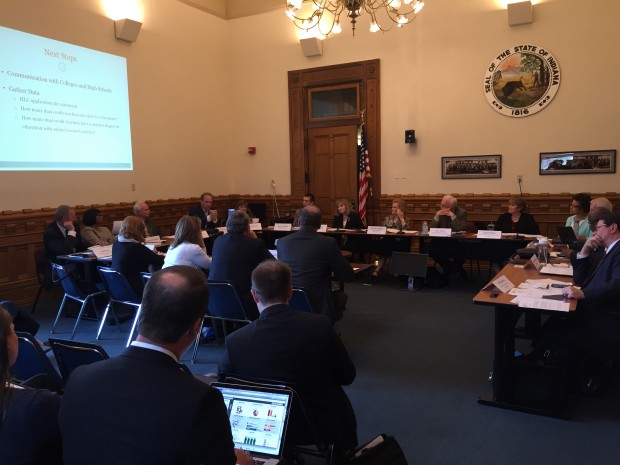Council Banks On Extension To Save Dual Credit Programs
A panel of Indiana educators, lawmakers and higher education officials are searching for a way to save Indiana classes that give high school students college credit.
Indiana high schools are required by law to teach those classes, but a new policy change from the Higher Learning Commission requires teachers to hold a masters degree and acquire additional training in order to teach them. They are known as dual-credit classes, and without a way to answer last fall’s new policy requirements, thousands of them could disappear.
The policy change is set to go into effect in September 2017. Now, that panel is banking on getting an extension.
On Tuesday, Teresa Lubbers, Commissioner of Higher Education, told the Indiana Dual Credit Advisory Council that her department will apply for an extension so teachers may have until September 2022 to meet the dual-credit requirements. The application is due by December.
“It’s definitely achievable and we have a strong commitment from all of the colleges and universities,” said Lubbers. “I’m very comfortable with the timeline, that we’ll have the application in time to actually be approved for the extension.”
The submission for the extension requires the department to submit data on ways colleges and universities currently use dual credit options. Lubbers says the department will gather that data and information on how local universities can offer more graduate courses, so teachers can meet the requirements.
She says they can complete the application by September and is confident the state will be granted extra time.
“We don’t have a backup plan because we are planning on the extension going through,” said Lubbers.
If the extension is approved, the new guidelines say schools may continue to hire dual credit teachers who not meet the requirements after 2017 — with the understanding they must become qualified within the extension window. For Indiana teachers, that could mean by 2022.
The effects of the incoming new teacher requirements have reverberated throughout the state, says Janet Boyle, Executive Director of Center of Excellence in Leadership of Learning (CELL). Her organization surveyed teachers’ and principals’ feelings on the new requirement.
Perceptions about whether or not a master’s resulted in being a better teacher were mixed. Many said learning about how to teach was just as important learning what to teach.
“Teachers do believe a masters can help them be a better teacher if its methodology and content, not just content alone,” Boyle said.
CELL’s survey also found that teachers said the content knowledge gained in graduate courses was too advanced to use in introductory dual-credit classes. In other words, the material learned from getting a masters degree, wouldn’t necessarily be used in the classes they teach.
